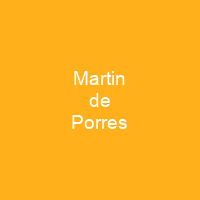Martín de Porres Velázquez, O. P. was a Peruvian lay brother of the Dominican Order. He was beatified in 1837 by Pope Gregory XVI and canonized in 1962 by Pope John XXIII. He is the patron saint of mixed-race people, barbers, innkeepers, public health workers, and all those seeking racial harmony.
About Martin de Porres in brief

One of his brethren reproved him for his preference for cleanliness, to which Martin replied: “Compassion, my dear Brother, is preferable to cleanliness” Martin is said to. have passed through the doors of the convent, locked to care for them, through the phenomenon of contagion, which was reported in the residence of the friars. The provincial superior, alarmed by the contagion threatening his residence, saw him suddenly and locked the doors to the convent. He then continued to transport the sick to the hospital, without the doors having been opened, until the provincial superior noticed him suddenly. He never became a priest, and he never professed religious vows as a Dominican lay brother in 1603. Under Peruvian law, descendants of Africans and Native Americans were barred from becoming full members of religious orders. The only route open to Martin was to ask the Dominicans of Holy Rosary Priory in Lima to accept him as a volunteer who performed menial tasks in the monastery in return for the privilege of wearing the habit.
You want to know more about Martin de Porres?
This page is based on the article Martin de Porres published in Wikipedia (as of Nov. 04, 2020) and was automatically summarized using artificial intelligence.







